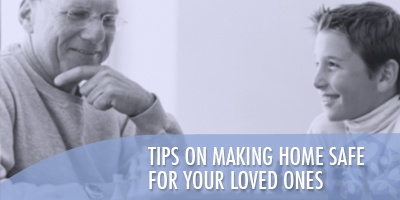Most people are familiar with the concept of childproofing a home when a new baby arrives. But what about bringing your aging parents in to live with you when independent living is no longer an option? There are several steps you can take to “elder-proof” your home and ensure a safe and comfortable environment for your parents in their later years. And when a parent, who is facing an advanced illness is living with you, home safety takes on a new level of importance.
A primary safety concern with the elderly is the prevention of falls. Falls are the leading cause of injury or even death among the elderly. This four part series will focus on ways to safeguard your home against potential falls.
General Tips For Preventing Falls
- Remove all tripping hazards such as books, shoes, toys, electrical cords, etc., from the floors.
- Remove all throw rugs.
- Remove furniture from high-traffic areas if possible, and pad any sharp edges with plastic bumpers.
- Remove the casters to stabilize movable furniture items.
- Remove unstable tables and stools to avoid tipping, and put fragile or breakable items away.
- If your parent uses a cane, you may also wish to attach a loose wrist loop to the handle. This will prevent your parent from having to bend down to retrieve a dropped cane.
- Polish linoleum and wood flooring using only non-slip floor wax.
- Textured strips can also be placed on linoleum to provide better grip, and all spills should be cleaned up immediately.
- Add grab bars or handrails along staircases and hallways to help prevent falls, and grab bars next to closet doors to support your parent while dressing.
- Place colored, non-slip strips along areas where floor levels change, such as stairs and doorway thresholds, to help clearly identify where your parent will need to step up or down and prevent stumbles.
- Make sure the bed and chairs are easy to get in and out of, and that chairs have solid and supportive arms and backs.
- Keep frequently used items such as glasses, water, phone, tissue, remote control, etc by bed or chair.
- If your loved one feels dizzy or light-headed after standing remind them to sit down or stay seated until their head clears or; call for assistance if available. Have them stand up slowly after eating, lying down or resting to avoid unsteadiness.
Understand that as your loved one begins to loose their independence it is important to try and understand their desire for independence while still ensuring they are safe. Including them on decisions, asking their opinion, concerns will help. Remember, this is not an easy time for them and though your ultimate goal is their safety, bringing them into the decision process will go a long way to make them regain a sense of control.
These few simple steps can make a big difference in providing a safe environment for your loved one.


